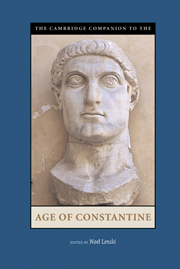Book contents
- Frontmatter
- Introduction
- 1 Sources for the History of Constantine
- Section 1 Politics and Personalities
- Section II Religion and Spiritual Life
- 5 The Impact of Constantine on Christianity
- 6 The Beginnings of Christianization
- 7 Traditional Religions
- Section III Law and Society
- Section IV Art and Culture
- Section V Empire and Beyond
- Appendix 1: Stemmata
- Appendix 2: Timeline
- Maps
- Primary Sources and Translations
- Secondary Bibliography
- Index
6 - The Beginnings of Christianization
from Section II - Religion and Spiritual Life
Published online by Cambridge University Press: 28 September 2007
- Frontmatter
- Introduction
- 1 Sources for the History of Constantine
- Section 1 Politics and Personalities
- Section II Religion and Spiritual Life
- 5 The Impact of Constantine on Christianity
- 6 The Beginnings of Christianization
- 7 Traditional Religions
- Section III Law and Society
- Section IV Art and Culture
- Section V Empire and Beyond
- Appendix 1: Stemmata
- Appendix 2: Timeline
- Maps
- Primary Sources and Translations
- Secondary Bibliography
- Index
Summary
During the reign of Constantine, Christianity was the religion of the emperor but not yet the religion of the empire. His policies and enactments on behalf of the church established the conditions in which Christianity could flourish and thus prepared his subjects for the Christianizing measures of his successors. If it were true, as some contend, that Christianity was but one of many converging “monotheisms,” the present chapter would not need to be carried beyond the first section. In the second, however, I shall argue that - considered as a cult, if not as an intellectual system - Christianity took on features under Constantine that precluded assimilation to its rivals. In the third, I shall follow the advance of synodal government and the rise of the episcopal grandees, who, as I argue in the fourth and final section, repaid the patronage of Constantine by hallowing his ambitions and endorsing a tacit parallel between earthly despotism and the monarchy of God.
Conversion: From What to What?
It is probable that by the mid-fourth century Christians made up more than half the entire population of the empire. The sociologist R. Stark has tentatively proposed that if the church had grown at a constant rate of 40 per cent each decade since the time of the apostles, it would have arrived at this preponderance without incurring any debt to Constantine.
- Type
- Chapter
- Information
- The Cambridge Companion to the Age of Constantine , pp. 137 - 158Publisher: Cambridge University PressPrint publication year: 2005
- 2
- Cited by



